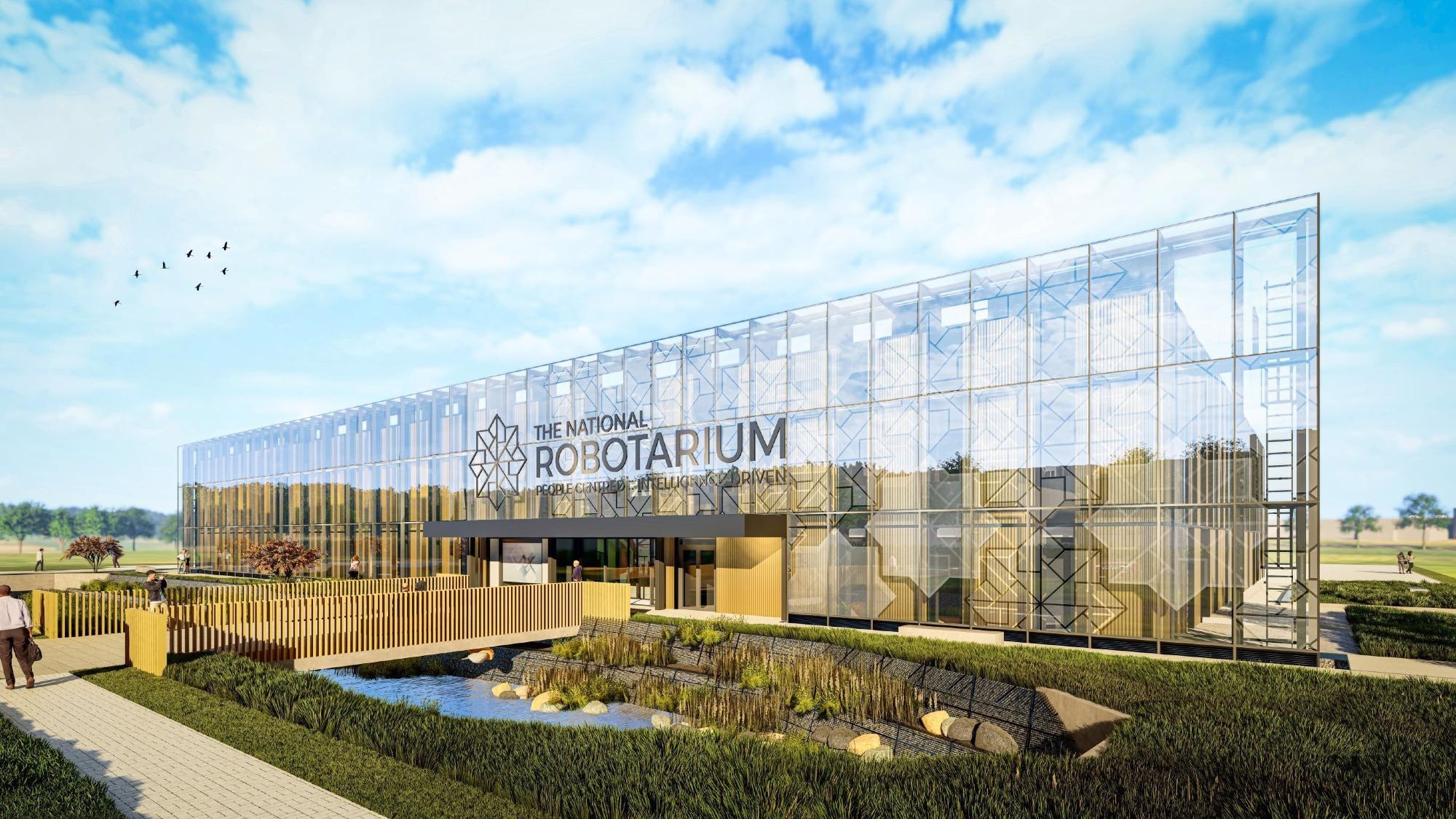A postgraduate student team from the National Robotarium, supported by Heriot-Watt University and the University of Edinburgh, has been selected to compete in Amazon’s new global AI competition. The eight-strong team will create an embodied agent to help people around the home, similar to a robot butler.
 A CGI of the new National Robotarium facility which will be opening later this year on the Heriot-Watt University campus. Image Credit: Heriot-Watt University
A CGI of the new National Robotarium facility which will be opening later this year on the Heriot-Watt University campus. Image Credit: Heriot-Watt University
Amazon’s Alexa Prize SimBot Challenge asks teams to create help for a futuristic world that can understand natural language, interact with humans and accomplish tasks and missions.
The National Robotarium team is the only non-US group to pass the initial selection process, demonstrating its world-leading expertise in embodied conversational AI research and teaching. The team will receive a grant of $250,000 to support its development costs.
The National Robotarium is part of the Data-Driven Innovation initiative and is supported by £21 million from the UK Government and £1.4 million from the Scottish Government through the £1.3 billion Edinburgh and South East Scotland City Region Deal - a 15 year investment programme jointly funded by both governments and regional partners.
Stewart Miller, CEO of the National Robotarium said: “To be the only team from any country in the world outside the USA to be selected for the Alexa PrizeSimBot Challenge demonstrates the global significance and capabilities of the teams within the National Robotarium. Backed by the combined robotic and AI experience of Heriot-Watt and the University of Edinburgh, we’re demonstrating our ability to lead global development in AI, pushing the boundaries of what’s possible in a domestic setting.”
UK Government Minister for Scotland, Ian Stewart said: "The National Robotarium's participation in this global competition is testament to the cutting-edge research happening in Scotland. It's exciting to think their designs could be helping people in their homes in the not too distant future. The UK Government is investing £5 billion a year in research and innovation and a further £1.7 billion in regional projects across Scotland to level up communities and build back better from the pandemic."
Economy Secretary Kate Forbes said: “Technology has the potential to change lives for the better, and harnessing advances to aid people around the home in response to human speech has potentially far-reaching benefits. I am pleased the Scottish Government is providing £1.4 million to support the National Robotarium as we move towards a sustainable and innovative economic recovery and I wish their team the very best of luck in this high profile competition.”
Professor Verena Rieser, Professor of Conversational AI at the National Robotarium, is advising the student team. She said: “The objective of Amazon’s latest Alexa Prize challenge perfectly aligns with the aims of the National Robotarium which is to use robotics and artificial intelligence research to help people, solve global challenges and work in partnership with industry. With AI technology and machine learning offering exciting opportunities to complement our daily lives, exploring how these innovations can be further embedded in our homes is a fantastic learning opportunity for our students.
“This competition has been carefully designed to advance the science behind embodied AI and demonstrates that our team is among the best in the world. They will also benefit from working closely with a global giant in AI development throughout the competition.
“Our university has a proven track record in creating next generation conversational AI, having been a finalist two years running in the Alexa Prize SocialBot Challenge. The research that underpinned our entry has now become a successful spin-out company named Alana which is currently working with the RNIB to build conversational systems for blind and partially sighted people. The SimBot Challenge will now allow us to both broaden and showcase our expertise in embodied AI, demonstrating how this research can be applied to tasks rather than to social interaction."
Alessandro Suglia, a tenure-track postdoctoral research fellow in Robotics and Autonomous Systems at the National Robotarium said: “We are enormously proud to be selected to take part in this prestigious competition. Our team will create a next-generation assistant capable of learning continuously. We will focus on natural language generation and reasoning, machine perception, navigation, manipulation and dialogue creation to further push the boundaries of AI through our research.”
The SimBot Challenge has two phases including a public benchmark which requires teams to design a machine-learning model with language-guided visual navigation and task completion. This is followed by a live interaction phase during which teams will test their bots to respond to customer commands and multimodal sensor inputs from within a virtual world. The National Robotarium team, named EMMA (Embodied Multimodal AI) will compete in both phases. The public benchmark challenge phase is also open to individuals from academia and industry.
Along with the research grant, team EMMA will benefit from Alexa-enabled devices, free Amazon Web Services (AWS) cloud computing services to support their research and development efforts, as well as other resources, and Alexa team support. The winning team will receive a $500,000 prize.